Research Staff
Gerassimos Voutsinas, Head of laboratory
Present Lab Members
Socratis Avgeris, MSc
2post-docs to be hired
Full list of Lab Members & Collaborators
Research Interests
A1. Identification and validation of drug targets for cancer therapy
A2. Development and evaluation of biomarkers for diagnosis, prognosis and response to treatment in human diseases.
B. Development of genetic testing protocols for molecular diagnosis of human genetic diseases
Recent and current research questions
Α. Recently, the laboratory has focused his work on the molecular pathogenesis and response to chemotherapy of urinary bladder cancer, which is the ninth most common malignancy worldwide. The low sensitivity of invasive disease in chemotherapy and high relapse percentages lead to poor five-year survival rates and make the study of the molecular mechanisms involved for valid prediction of disease outcome and selection of appropriate therapy particularly important.
-
The role of PI3K-Akt pathway in urinary bladder cancer (Stephanos Kachrilas, MD, Dimitra Anastasiou, Socratis Avgeris, MSc, Maria Horti, MD, PhD, Ariana Gavriil, PhD, Sophia Tseleni-Balafouta, MD, PhD, Konstantinos Livadas, MD, PhD, Athanasios Papatsoris, MD, PhD, Gerasimos Alivizatos, MD, PhD, Charalambos Deliveliotis, MD, PhD, Dimitrios Stravopodis, PhD)
The PI3K-Akt pathway is often involved in carcinogenesis because of its regulatory role in cell proliferation, apoptosis, invasion, and resistance to chemotherapy.
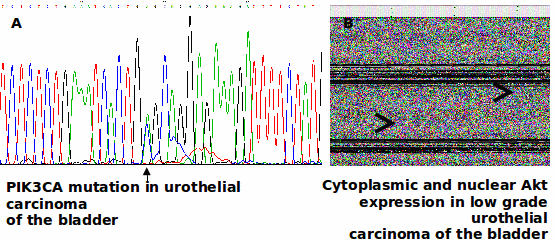
Here, we focused on the mechanism of pathway deregulation, the molecules that play a key role in this mechanism, and the consequences on bladder cancer cells.
-
Epithelial to mesenchymal phenotype in bladder cancer cells (Eumorphia Konstantakou, PhD, Panagiotis Karkoulis, PhD, Georgios Koutlis, MSc, Ioannis Sfiniadakis, MD, PhD, Georgios Tsangaris, PhD, Ema Anastasiadou, PhD, Dimitrios Stravopodis, PhD)
In this activity, we were engaged in the study of the regulation of epithelial and mesenchymal markers in cancer cells of the bladder, based on the malignancy grade.
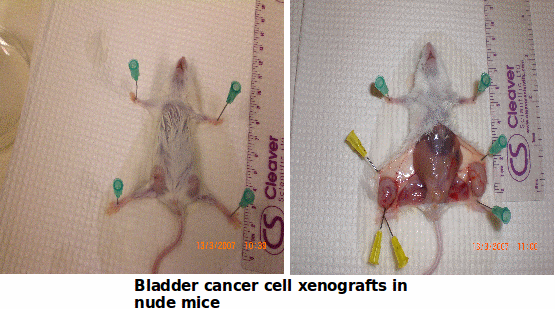
We have compared cancer cell lines of varying degrees of differentiation, using flow cytometry, proteomic analysis, Western immunoblotting, immunohistochemistry, cytogenetics and tumor xenografts in immunocompromised mice.
-
Activity of conventional chemotherapeutic drugs in bladder cancer cell lines (Panagiotis Karkoulis, PhD, Eumorphia Konstantakou, PhD, Antonios Lampidonis, PhD, Sophia Melachroinou, MSc, Dimitra Anastasiou, Stephanos Kachrilas, MD, Gerasimos Aravantinos, MD, PhD, Ema Anastasiadou, PhD, Dimitrios Stravopodis, PhD)
Here, we were interested in the effect of conventional chemotherapy in different genomic contexts of bladder cancer cells.
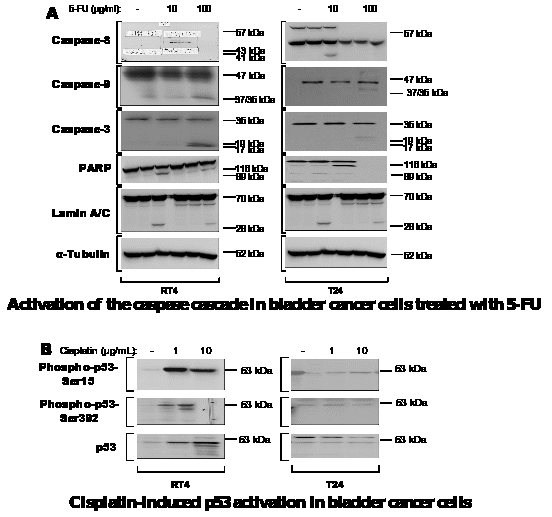
We have worked with chemotherapeutic agents such as doxorubicin and cisplatin, used as the basic components of the combined chemotherapy protocol MVAC for invasive disease, and 5-FU.
-
The effects of targeted inhibitors on bladder cancer cell lines
(Panagiotis Karkoulis, PhD, Eumorphia Konstantakou, PhD, Dimitrios Stravopodis, PhD)
In this activity, we have studied the effects of targeted inhibition of heat shock protein 90 (Hsp90) or the proteasome on survival, cell cycle, signaling and motility of bladder cancer cells.
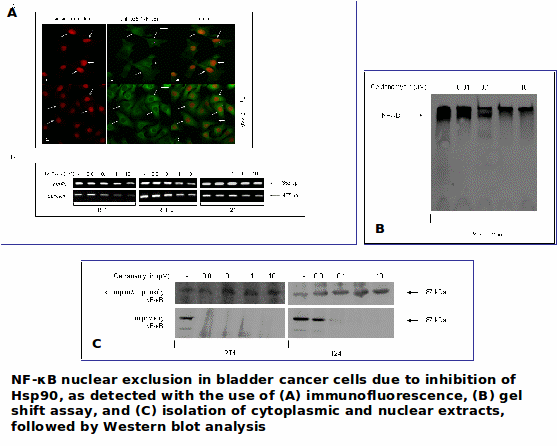
Furthermore, using the same cells, we have analyzed the differential expression at the proteomic level, after incubations with relative targeted inhibitors.
-
The effects of targeted inhibitors on mouse cardiomyocytes (Angeliki Delimitsou, MSc, Dimitrios Stravopodis, PhD)
This is a recent activity of our lab, in which we are studying the effects of mTOR pathway inhibition on the survival, cell cycle and signaling in mouse cardiomyocytes, using temsirolimus, an hemisynthetic analogue of rapamycin.
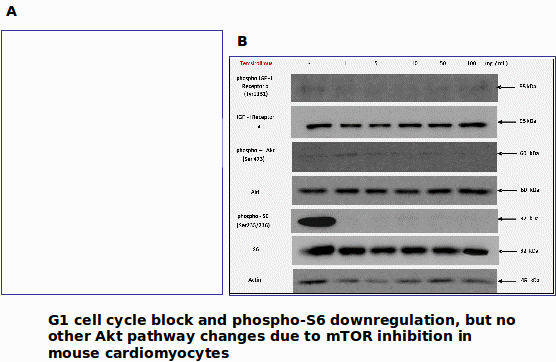
Β. Relatively recently, our lab is interested in the development of protocols for molecular diagnosis of rare genetic diseases, targeting in providing reliable but also low price services to rare disease families. In this context, genetic tests for Tuberous Sclerosis Complex and Neurofibromatosis type I, have been developed, while recently, our laboratory, in a new collaboration with the Laboratory of Molecular Diagnostics, INRASTES, NCSR "Demokritos", is working on the analysis of genetic predisposition to breast cancer.
-
Development of a protocol for molecular diagnosis of Tuberous Sclerosis Complex (Socratis Avgeris, MSc)
After its establishment, this test is offered to the families bearing the specific genetic condition, in the context of specialized research and technology service provision.
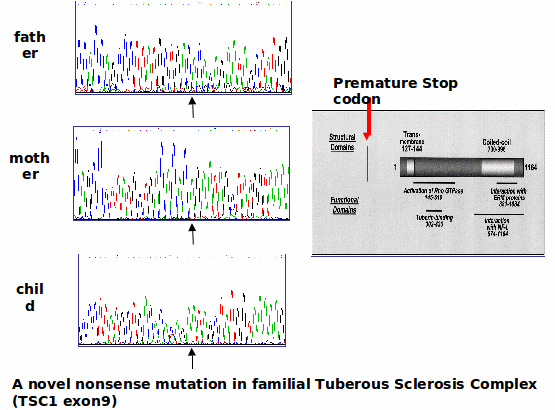
It should be noted that our laboratory is totally unique in the Greek territory in carrying out the genetic test for this relatively common rare disease (1 person suffering : 10000 births).
-
Development of a protocol for molecular diagnosis of Neurofibromatosis type I (Eleutheria Peristeri, MSc, Socratis Avgeris, MSc)
After its establishment, this test is offered to the families bearing the specific genetic condition, in the context of specialized research and technology service provision. Like Tuberous Sclerosis Complex, Neurofibromatosis type I is also a relatively common rare disease (1 person suffering : 4000-5000 births)
-
Genetic analysis of cancer predisposition syndromes (Socratis Avgeris, MSc)
This is a new activity in our laboratory in collaboration with the laboratory of Molecular Diagnostics, INRASTES, NCSR "Demokritos". In the context of this cooperation, protocols for rapid detection of mutations with the use of a quantitative real-time PCR have been established and are now used to screen large numbers of breast cancer samples.










